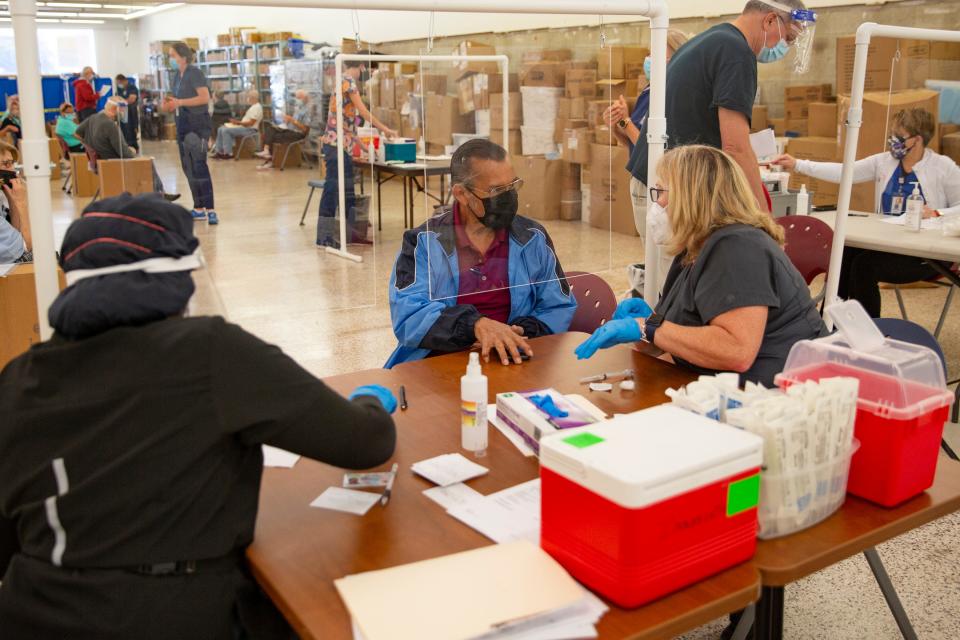Florida's health drops to 31st overall among states; was 27th last year
Florida has taken a turn for the worse when it comes to health, ranking among the bottom 20% percent of states in key indicators including access to care and preventable hospitalizations, according to the latest America’s Health Ranking.

Florida is now 31st among states for overall health, a slide from 27th place last year, according to the assessment done annually the American Public Health Association and the United Health Foundation.
Florida ranks 44th among the 50 states for public health funding and 43rd for people avoiding getting medical care when it is needed because of the cost.
Roughly 13% of Florida residents avoided getting medical care because of the expense while the national rate is 10%.
The reason for Florida sliding in its ranking is not something that the analysis aims to explain; the findings are instead designed to spark a conversation and encourage action, according to United Health Foundation.

The state is near bottom at 46th place for its high uninsured rate of 11% compared to 8% nationwide. That is a factor for why the state is near the bottom, at 41st place, for preventable hospitalizations among seniors.
The state Department of Health in Tallahassee, which oversees public health services, could not be reached for comment.
More: Florida ranks 27 among states for overall health, but drug deaths spiked 52%
More: Most SWFL hospitals earn high marks for patient safety and outcomes
The healthiest states are generally in the Northeast which are New Hampshire, Massachusetts, Vermont, Connecticut and Minnesota, according to the rankings.
The unhealthiest states tend to be in the South and are Louisiana, Mississippi, Arkansas, Oklahoma and Alabama.
Chronic medical diseases on rise in U.S.
The annual report is in its 34th year and is designed to gain perspective on the health well being of the nation and where there have been improvements and setbacks. The analysis uses 28 data sources for 87 measures of health, lifestyle and surroundings.
“Efforts like (the ranking) underscore the importance of having high-quality demographic population data for benchmarking, as well as for tracking where we are and where we need to go,” Dr. David Huang, with the National Center for Health Statistics that is part of the U.S. Centers for Disease Control and Prevention, said in the report.
The analysis found eight chronic health conditions reached their highest numbers since the national rankings began.
A total of 29 million Americans report three or more chronic conditions. That is 11% of the U.S. population.
The conditions are arthritis, asthma, cancer, heart disease, chronic kidney disease, chronic obstructive pulmonary disease, depression and diabetes.
More: Life for Florida's elders: The good, the bad, the ugly in new report
Rates of depression surged nearly 22% to affect 54 million adults while diabetes increased nearly 12% with 32 million Americans having the disease, the data shows.
Roughly 8% of adults, or 21 million Americans, reported having been diagnosed with cancer excluding non-melanoma skin cancer.
The chronic disease rates for each state was not included in state reports although Florida saw a 16% increase in its premature death rate before the age of 75.
The country saw a 13% decline in the number of primary care providers of roughly 107,000 professionals, an issue that has been ongoing for years in Florida and across the country.
Florida Gov. Ron DeSantis, who is seeking the Republican nomination for president, is opposed to expanding Medicaid coverage to the low income under the Affordable Care Act yet his budget plan for next year increases Medicaid rates to physicians and other providers to improve access to services.
He proposes $117 million in rate increases for hospital labor and delivery, $79 million in rate increases to physicians for adult care, and $295 million for mobile services for primary care and behavioral health.
Expanding physician residency funding is one way to address physician shortages and DeSantis’ budget includes $429 million for graduate residency education, the same amount that was in the 2023 budget.
Other key data points
Adults in Florida are not getting the flu vaccine; the state is 46th for its flu vaccination rate, according to the findings.
A longstanding issue is lack of sufficient access to mental health providers with Florida 43rd for its rate of dedicated mental health providers based on population.
The finding about mental health access in Florida is similar to what’s been found at the local level, including in the recent community assessment by the Collier Community Foundation, Nancy Dauphinais, chief operating officer of the David Lawrence Mental Health Center in Collier County, said in an email.
That’s where 23% of surveyed residents say mental health access needs to be a priority, along with controlling housing costs, managing growth and protecting the environment.
The community assessment, released in late October, was done in conjunction with the Richard M. Schulze Foundation to gauge how quality of life has changed since 2018 and what should be priorities.
“We know that we can make a difference through collective impact,” she said. “We will continue to increase awareness of these vital issues among Florida citizens, and continue to urge residents to increase their advocacy efforts at the local, state, and federal levels to bring about meaningful and sustainable solutions.”
Does Florida stand out anywhere?
Florida ranks second among states for its fourth grade reading proficiency although the state is 36th for its high school graduation rate of nearly 90%. That is the same as the national U.S. high school graduation rate at 90%.
The state ranks fourth for its adult exercise rate with 27% engaging in exercise, which is better than 23% rate in the U.S.
Occupational fatalities dropped 16% from a rate of five deaths per 100,000 workers to 4.3 deaths per 100,000 workers.
The state is 11th in tobacco use with 11% of adults smoking verses 14% in the U.S.
Florida ranks 12th for excessive drinking among adults where near 17% report engaging in this behavior while the national rate is 18%.
This article originally appeared on Naples Daily News: America's Health Ranking shows Florida in bottom 20% of states

